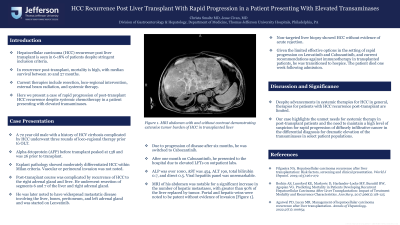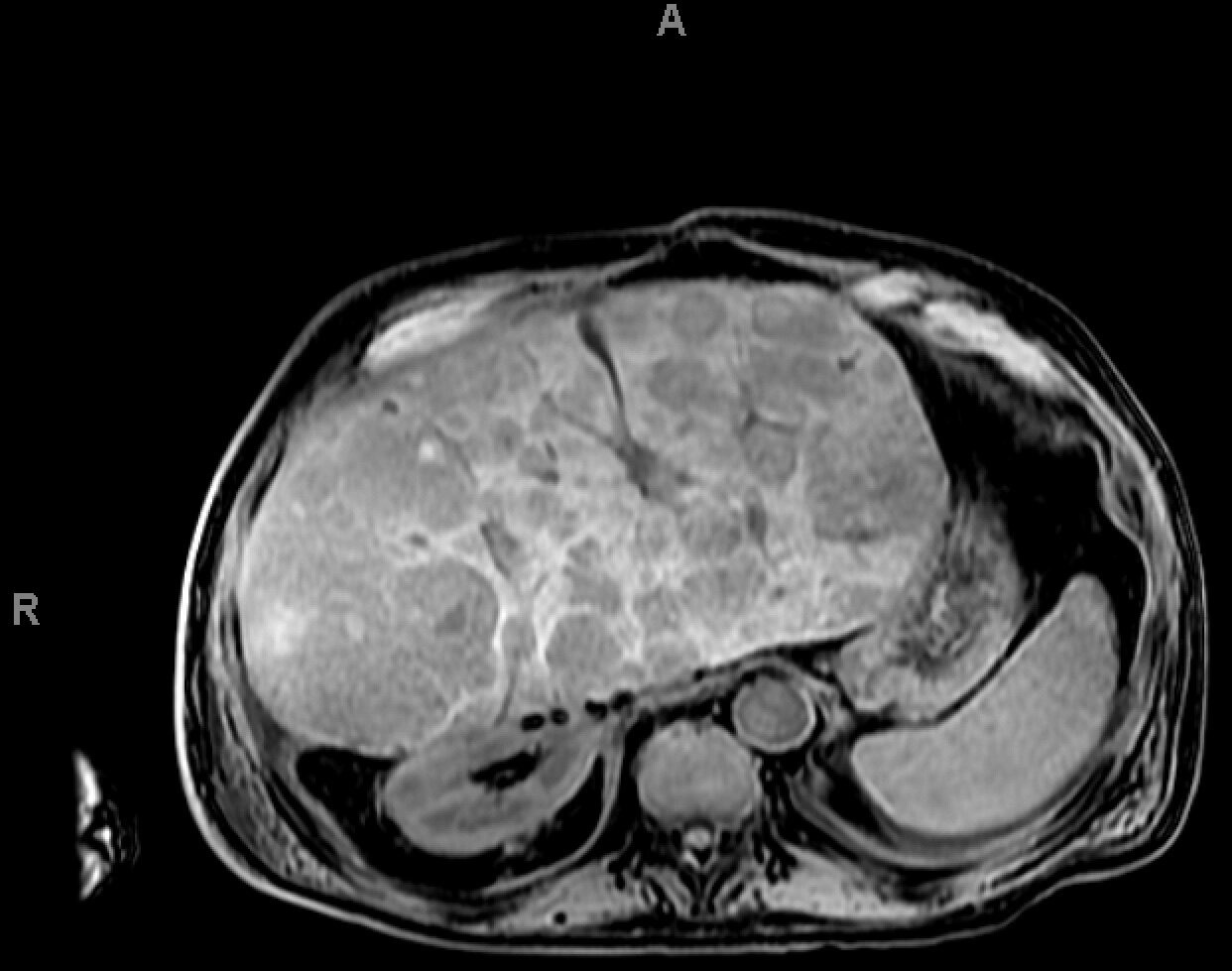Back


Poster Session D - Tuesday Morning
Category: Liver
D0555 - HCC Recurrence Post Liver Transplant With Rapid Progression in a Patient Presenting With Elevated Transaminases
Tuesday, October 25, 2022
10:00 AM – 12:00 PM ET
Location: Crown Ballroom

Has Audio

Christa Smaltz, MD
Thomas Jefferson University Hospital
Philadelphia, PA
Presenting Author(s)
Christa Smaltz, MD1, Jesse Civan, MD2
1Thomas Jefferson University Hospital, Philadelphia, PA; 2Sidney Kimmel Medical College at Thomas Jefferson University, Philadelphia, PA
Introduction: Hepatocellular carcinoma (HCC) recurrence post liver transplant is seen in 6-18% of patients despite stringent inclusion criteria. In recurrence post-transplant, mortality is high, with median survival between 10 and 27 months. Current therapies include resection, loco-regional intervention, external beam radiation, and systemic therapy. Here we present a case of rapid progression of post-transplant HCC recurrence despite systemic chemotherapy in a patient presenting with elevated transaminases.
Case Description/Methods: A 72 year old male with a history of HCV cirrhosis complicated by HCC underwent three rounds of loco-regional therapy prior to OLT. Alpha-fetoprotein (AFP) before transplant peaked at 138 and was 26 prior to transplant. Explant pathology showed moderately differentiated HCC within Milan criteria. Vascular or perineural invasion was not noted. His post-transplant course was complicated by recurrence of HCC to the right adrenal gland and liver. He underwent resection of segments 6 and 7 of the liver and right adrenal gland. He was later noted to have widespread metastatic disease involving the liver, bones, peritoneum, and left adrenal gland and was started on Lenvatinib. Due to progression of disease after six months, he was switched to Cabozantinib. After one month on Cabozantinib, he presented to the hospital due to elevated LFTs on outpatient labs. ALP was over 1000, AST was 454, ALT 190, total bilirubin 0.7, and direct 0.5. Viral hepatitis panel was unremarkable. MRI of his abdomen was notable for a significant increase in the number of hepatic metastases, with greater than 90% of the liver replaced by tumor. Portal and hepatic veins were noted to be patent without evidence of invasion. Non-targeted liver biopsy showed HCC without evidence of acute rejection. Given the limited effective options in the setting of rapid progression on Levatinib and Cabozantinib, and current recommendations against immunotherapy in transplanted patients, he was transitioned to hospice. The patient died one week following admission.
Discussion: Despite advancements in systemic therapies for HCC in general, therapies for patients with HCC recurrence post-transplant are limited. Our case is important as it highlights the unmet needs for systemic therapy in post-transplant patients and the need to maintain a high level of suspicion for rapid progression of diffusely infiltrative cancer in the differential diagnosis for dramatic elevation of the transaminases in select patient populations.

Disclosures:
Christa Smaltz, MD1, Jesse Civan, MD2. D0555 - HCC Recurrence Post Liver Transplant With Rapid Progression in a Patient Presenting With Elevated Transaminases, ACG 2022 Annual Scientific Meeting Abstracts. Charlotte, NC: American College of Gastroenterology.
1Thomas Jefferson University Hospital, Philadelphia, PA; 2Sidney Kimmel Medical College at Thomas Jefferson University, Philadelphia, PA
Introduction: Hepatocellular carcinoma (HCC) recurrence post liver transplant is seen in 6-18% of patients despite stringent inclusion criteria. In recurrence post-transplant, mortality is high, with median survival between 10 and 27 months. Current therapies include resection, loco-regional intervention, external beam radiation, and systemic therapy. Here we present a case of rapid progression of post-transplant HCC recurrence despite systemic chemotherapy in a patient presenting with elevated transaminases.
Case Description/Methods: A 72 year old male with a history of HCV cirrhosis complicated by HCC underwent three rounds of loco-regional therapy prior to OLT. Alpha-fetoprotein (AFP) before transplant peaked at 138 and was 26 prior to transplant. Explant pathology showed moderately differentiated HCC within Milan criteria. Vascular or perineural invasion was not noted. His post-transplant course was complicated by recurrence of HCC to the right adrenal gland and liver. He underwent resection of segments 6 and 7 of the liver and right adrenal gland. He was later noted to have widespread metastatic disease involving the liver, bones, peritoneum, and left adrenal gland and was started on Lenvatinib. Due to progression of disease after six months, he was switched to Cabozantinib. After one month on Cabozantinib, he presented to the hospital due to elevated LFTs on outpatient labs. ALP was over 1000, AST was 454, ALT 190, total bilirubin 0.7, and direct 0.5. Viral hepatitis panel was unremarkable. MRI of his abdomen was notable for a significant increase in the number of hepatic metastases, with greater than 90% of the liver replaced by tumor. Portal and hepatic veins were noted to be patent without evidence of invasion. Non-targeted liver biopsy showed HCC without evidence of acute rejection. Given the limited effective options in the setting of rapid progression on Levatinib and Cabozantinib, and current recommendations against immunotherapy in transplanted patients, he was transitioned to hospice. The patient died one week following admission.
Discussion: Despite advancements in systemic therapies for HCC in general, therapies for patients with HCC recurrence post-transplant are limited. Our case is important as it highlights the unmet needs for systemic therapy in post-transplant patients and the need to maintain a high level of suspicion for rapid progression of diffusely infiltrative cancer in the differential diagnosis for dramatic elevation of the transaminases in select patient populations.

Figure: MRI abdomen with and without contrast demonstrating extensive tumor burden of HCC in transplanted liver.
Disclosures:
Christa Smaltz indicated no relevant financial relationships.
Jesse Civan indicated no relevant financial relationships.
Christa Smaltz, MD1, Jesse Civan, MD2. D0555 - HCC Recurrence Post Liver Transplant With Rapid Progression in a Patient Presenting With Elevated Transaminases, ACG 2022 Annual Scientific Meeting Abstracts. Charlotte, NC: American College of Gastroenterology.
